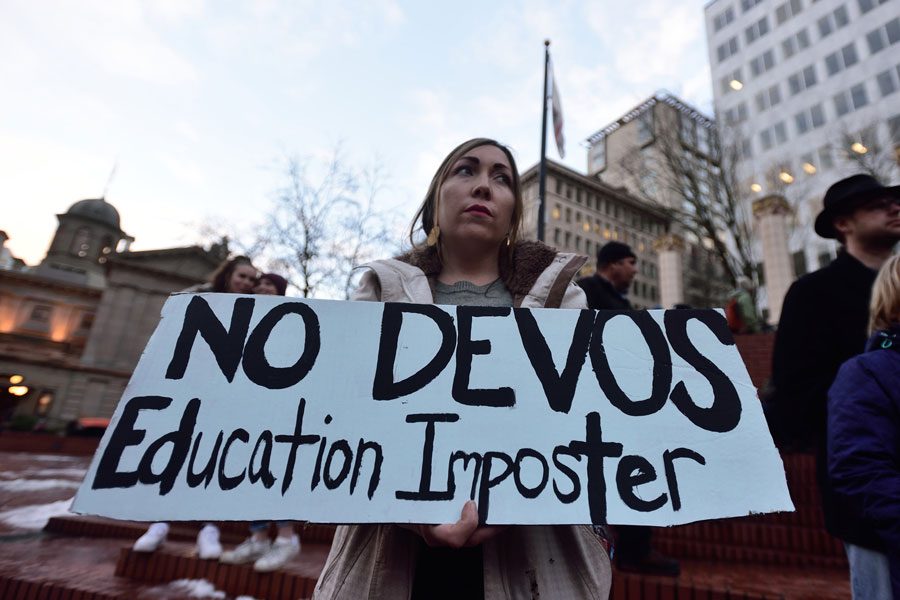DeVos confirmed as Secretary of Education despite controversy
Photo by Alex Milan Tracy/Sipa USA/TNS
Students protest against President-elect Donald J. Trump’s nominee for education secretary, Betsy DeVos, on Jan. 19, 2017 in Portland, Ore.
February 9, 2017
Betsy DeVos was confirmed by the Senate on Feb. 7 to be the Secretary of Education. The vote was 51-50, won with a historic tie-break vote from Vice President Mike Pence.
The main concern with her nomination was that DeVos has no experience with public education as a teacher or an administrator.
“It is critical to have someone with experience dealing with education issues,” Principal Brad Bailey said. “A leader of the Department of Education should have knowledge of how schools in which they govern operate including federal statutes, instruction, curriculum, accountability, financials, ELL, SPED, 504 and many others that directly affect the success of our students.”
Teachers and administrators weren’t the only ones who held strong opposition to DeVos and her policies. Parents and students expressed extreme dislike for DeVos, but it didn’t seem to affect the opinions of politicians.
Texas Senator John Cornyn made a Facebook post in support of DeVos, stating his belief that the choice system would be beneficial to parents and students. Many constituents of Cornyn expressed their dislike of DeVos and her policies in the comments section, both asking that he reconsider and claiming that he would be voted out of office when the next election came.
Her experience with education comes from extensive support of the “school choice” movement, which is basically the privatization of education. If DeVos had her way, public schools would no longer exist; education would come solely in the form of private and charter schools.
Charter schools are a newer form of private school that are usually specific to one subject area such as math, reading or the arts and don’t have to follow standards and testing required of other schools.
“Charter schools are a private venture,” history teacher Chuck Zach said, “so someone has to want to start a charter school to have more of them. That means they can choose what students attend that school, and attend whichever guidelines they want.”
Additionally, DeVos is a supporter of the voucher system, in which a child could apply for a “voucher”–essentially a full ride scholarship–to attend a private or charter school.
A second controversy stems from charter schools themselves, and what they contribute to a legitimate education. Supporters believe the specification of course material and exemption from standardized tests can provide a more purposeful and positive education. Critics claim that the lack of regulations leave the school open to hire poor teachers and give students a subpar education.
In the state of Texas, public schools outperformed charter schools in the past year. According to the Texas Education Agency, campuses that Met Standard (a rating given by the state) went up 2.1% in public schools, but down 0.5% for charter schools.
The concern is that DeVos will hurt education as a whole by encouraging the development of charter schools that won’t be run properly. However, she can only have so much impact on schools. Education is an issue largely left up to the states, and it will remain this way no matter who heads the Department of Education.
“[The Secretary’s] main function is to establish policy, administer and coordinate educational programs and enforce educational laws equally,” Bailey said. “If school choice is law, then the DoE would have to enforce this as a federal law. Right now, it is up to the states on if they want to pass a school choice program in their state.”
The future of school development is uncertain, but teachers and administrators stand determined to provide a quality education despite changes.
“If the voucher system is set up fairly where all schools both private and charter are held by the same accountability standards that public schools are held to, then it would be open to a competitive market,” Bailey said. “Regardless of the outcome of legislation, we will continue to do what is best for our students and will provide them with the best educational setting to be successful and prepared for life after high school.”















